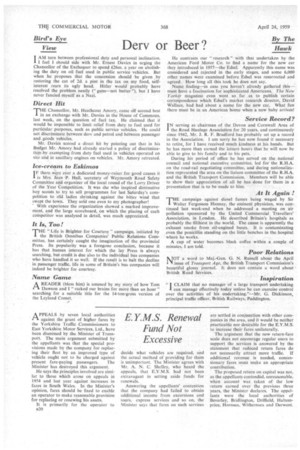Dery or Beer?
Page 54

If you've noticed an error in this article please click here to report it so we can fix it.
Bird's Eye View By The Hawk
AM torn between professional duty and personal inclination.
I feel I should side with Mr. Ernest Davies in urging the Chancellor of the Exchequer to spend £26m. a year on abolishing the duty on oil fuel used in public service vehicles. But when he proposes that the concession should be given by restoring the cut of 2d. a pint in the tax on my food, selfinterest rears its ugly head. Hitler would probably have resolved the problem neatly (" guns—not butter "), but I have never fancied myself as a Nazi.
Direct Hit
T"Chancellor, Mr. Heathcoat Amory, came Off second best in an exchange with Mr. Davies in the House of Commons, last week, on the question of fuel tax. He claimed that it would be impossible to limit relief from duty to fuel used for particular :purposes, such as public service vehicles. He could not discriminate between dery and petrol and between passenger and goods vehicles.
Mr.Davies scored a direct hit by pointing out that in his Budget Mr. Amory had already started a policy of discriminati*by exempting from duty fuel used in vehicles operated on site and in ancillary engines on vehicles. Mr. Amory retreated.
Ice-cream to Eskimos
I F there were ever a dedicated money-raiser for good causes it isMrs. Jean P. Hall, secretary of Weymouth Road Safety Committee arid organizer of the local round of the Lorry Driver of the year Competition. It was She who inspired diminutive boy scouts to try to sell programmes for last Saturday's competition to old ladies shrinking against the hitter wind that swept the town. They sold one even to my photographer! .
With experience the organization showed a marked improvement, and the large scoreboard, an which the placing of each competitor was analysed in detail, was much appreciated.
It Is, Too!
THE "Life is Brighter for Courtesy" campaign, initiated by the British Omnibus Companies' Public Relations Committee, has certainly caught the imagination of the provincial Press. Its popularity was a foregone conclusion, because it has that human interest for which the lay Press is always searching, but credit is due also to the individual bus companies who have handled it so well. If the result is to halt the decline in passenger traffic, life in some of Britain's bus companies will indeed be brighter for courtesy.
Name Game
AREADER (bless him) is amused by my story of how Tom Dawson and I "racked our brains for more than an hour" searching for a suitable title for the 14-ton-gross version of the Leyland Comet.
He contrasts our " research " with that undertaken by the American Ford Motor Co. to find a name for the new car they introduced in 1957—the Edsel. Apparently this name was considered and rejected in the early stages, and some 6,000 other names were examined before Edsel was resurrected and agreed. How long all this took he does not say.
Name finding—in case you haven't already gathered this— must have a fascination for sophisticated Americans. The New Yorker magazine even .went so far as to publish certain correspondence which Edsel's market research director, David Wallace, had had about a name for the new car. What fun there must be in an American home when a new baby arrives!
Service Record?
I N serving as chairman of the Devon and Cornwall Area of the Road Haulage Association for 20 years, and continuously since 1942, Mr, J. R. F. Bradford has probably set up a record in the Association. I am sorry he has now found it necessary to retire, for I have received much kindness at his hands. But he has more than earned the leisure hours that he will now he able to give to his family and to his pets.
During his period of office he has served on the national council and national executive committee, led for the R.H.A. on the road-rail negotiating committee, and during nationalization represented the area on the liaison committee of the R.H.A. and the British Transport Commission. Members will be able to show their appreciation of all he has done for them in a presentation that is to he made to him.
At It Again.'
'THE campaign against diesel fumes being waged by Sir I. Walter Fergusson Hannay, the eminent physician, was continued last week-end when he addressed a meeting on air pollution sponsored by the United Commercial Travellers' Association, in London. He described Britain's hospitals as probably the filthiest in the world. The cause is apparently the exhaust smoke from oil-engined buses. It is contaminating even the penicillin standing on the little benches in the hospital where he works.
A cup of water becomes black coffee within a couple of minutes, I am told.
Poor Relations
MOT a word to Maj.-Gen. G. N. Russell about the April issue of Transport Age, the British Transport Commission's beautiful glossy journal. It does not contain a word about • British Road Services.
Inspiration -1 CLAIM that no manager of a large transport undertaking I can manage effectively today unless he can exercise control over the activities of his undertaking."—Mr. G. Dickinson, principal traffic officer, British Railways, Paddington.




































































































